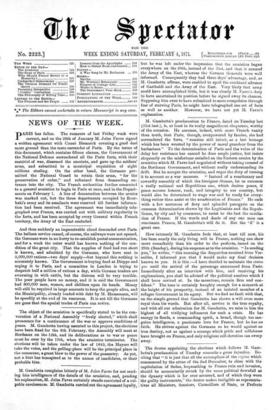M. Gambetta complains bitterly of M. Jules Fevre for not
send- ing him intelligence of the details of the armistice, and, pending his explanation, M. Jules Fevre certainly stands convicted of a cul- pable carelessness. M. Gambetta carried out the agreement loyally, but he was left under the impression that the armistice began everywhere on the 28th, instead of the 31st, and that it covered the Army of the East, whereas the German Generals were well informed. Consequently they had three days' advantage, and, as M. Gambetta affirms, were enabled to spoil the combined advance of Garibaldi and the Army of the East. Very likely that army could have accomplished little, but it was clearly M. Favre's duty to have ascertained its position before he signed away its chances. Supposing him even to have submitted to mere compulsion through fear of starving Paris, he might have telegraphed one set of facts as well as another. However, we have not yet M. Favre's explanation.






























